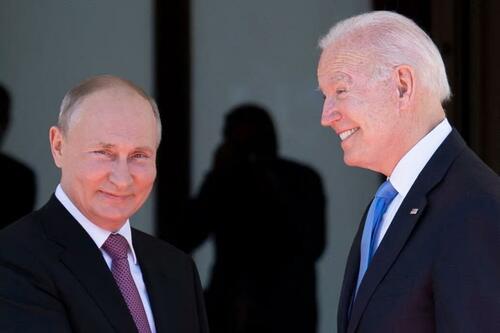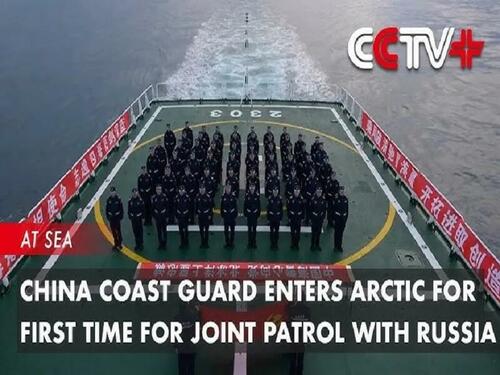Sweden To Ban Cousin Marriages To Combat Honor Oppression & Health Risks
Sweden To Ban Cousin Marriages To Combat Honor Oppression & Health Risks
Authored by Thomas Brooke via Remix News,
The Swedish government is considering a law change that would ban marriages between cousins, a move primarily aimed at curbing issues such as honor oppression prevalent in migrant communities.
The proposal, which was introduced by government investigators and aligns with policies laid out in the Tidö Agreement, which facilitated the formation of the current government, would also extend to marriages between other close relatives, such as uncles and nieces.
If approved, the ban could come into effect as early as 2026.
Currently, Swedish law prohibits marriages between parents and children or full siblings, though half-siblings can marry with an exemption. Marriages between cousins are still legal, but this may soon change.
A government-appointed inquiry, which began in September last year, now recommends that cousin marriages be banned under the Marriage Code, citing both social and health concerns.
The proposed ban has significant implications for Sweden’s migrant communities, where cousin marriages are far more common. While this is defended as a cultural practice that prioritizes familial ties, government officials argue that such arranged marriages increase the risk of honor oppression, particularly for young women and girls.
By outlawing cousin marriages, they believe they can reduce the likelihood of coercion and other forms of control within family structures.
Preempting a loophole, a key element of the proposal is that cousin marriages performed abroad will also not be recognized in Sweden, regardless of the spouses’ connection to the country. This is intended to prevent couples from bypassing Swedish law by marrying abroad and then returning to Sweden.
“The recognition ban will be general and cover all cousin marriages,” the inquiry’s findings stated, as cited by the SVT broadcaster, reinforcing the aim to counteract honor-based oppression across all backgrounds.
In Norway, a similar law was enacted this past summer, with officials highlighting the increased risk of genetic disorders and health complications caused by inbreeding.
These risks include higher rates of stillbirth and infant mortality.
In addition to the ban on cousin marriages, the inquiry also suggests eliminating the current exemption that allows half-siblings to marry in certain circumstances, thus better protecting vulnerable individuals from coercion.
A final decision on the reforms is expected in the coming months which, if passed, is expected to enter into force in 2026.
Tyler Durden
Thu, 10/10/2024 – 06:30
What’s Really Outrageous About Woodward’s New Book
What’s Really Outrageous About Woodward’s New Book
Authored by Alan Tonelson via RealityChek,
So much outrage (including from Vice President and Democratic presidential contender Kamala Harris) about the claim in Bob Woodward’s upcoming book that Donald Trump during his presidency sent some test kits to Russian dictator Vladimir Putin at the height of the Covid pandemic when they were scarce in the United States. And about the famed journalist’s report that the former president called Putin seven times since the former left the Oval Office in January, 2021. (See, e.g., here.)
And so little about by far the biggest outrage described in War (if true, of course – as with the above revelations): that President Biden may have pushed the United States, and the world, to within a coin flip of nuclear war in Ukraine.
Think I’m kidding? Here’s the description by CNN – which broke the news about Woodward’s book – his account of a crucial moment in U.S. policy toward Russia’s invasion. It’s worth quoting in full:
By September 2022, US intelligence reports deemed “exquisite” revealed a “deeply unnerving assessment” of Putin — that he was so desperate about battlefield losses that he might use tactical nuclear weapons in Ukraine.
“Based on the alarming new intelligence reports, the White House believed there was a 50% chance Russia would use a tactical nuclear weapon — a striking assessment that had skyrocketed up from 5% and then 10%, Woodward reports.
“’On all channels, get on the line with the Russians,’ Biden instructed his national security adviser, Jake Sullivan. ‘Tell them what we will do in response,’ he said, according to Woodward.”
That’s the key phrase: “Tell them what we will do in response.”
It doesn’t necessarily mean that Mr. Biden had decided to use a nuclear weapon against Russia itself, or even against Russian forces inside Ukraine, or was considering such actions. Nor does it necessarily mean that the president had decided to deploy U.S. military forces in Ukraine in response.
But it’s difficult to imagine what else President Biden might have been thinking of that would deter the Russians from a step like tactical nuclear weapons use, or that would have convinced them to abandon this policy after firing one nuclear shot.

And the real outrage here – again, if Woodward has the story right – is that Mr. Biden actually was prepared to run such a catastrophic risk on behalf of a country whose fate Washington had never officially considered to be a remotely vital American security interest even at the height of the Cold War — and still hasn’t.
It’s one thing to threaten nuclear weapons use to protect a country or region that has been deemed a vital interest by U.S. leaders – like Western Europe or Japan. Or to do so when adversaries try to place nuclear weapons close to the American homeland (as was the case with the Soviet Union during the Cuban missile crisis of 1962).
But even to contemplate Armageddon in a situation meeting absolutely none of these characteristics? How can that be viewed as anything but needlessly reckless and even suicidal?
Bob Woodward reports that at one point Biden believed there was a 50% chance of Russia using nukes over Ukraine
He chose to escalate the war anyways and lied to the American people about the risk pic.twitter.com/Ce8IMAST9w
— Saagar Enjeti (@esaagar) October 8, 2024
Keep that in mind the next time you hear that Republican presidential candidate Donald Trump is too dangerously off his rocker to be fit for the presidency (in particular that his warnings about the current administration bringing World War III closer are nothing more than fear-mongering). And that the aforementioned Kamala Harris, when asked what she would have done differently from Mr. Biden, responded, “Not a thing that comes to mind.”
Tyler Durden
Wed, 10/09/2024 – 23:25
JACK POSOBIEC: Joe and Jill Biden don’t want Kamala Harris to ‘pull this off’
“Folks, you’re looking at the primal scream of a dying regime.”
France bans Osama Bin Laden’s son from returning to Normandy where he lived for 7 years as a landscape portrait painter
Omar Bin Laden is now banned from returning to France “for any reason whatsoever.”
North Korea to completely block border to South Korea amid escalating tensions
Prior to this announcement, North Korea had already begun laying landmines and erecting barriers along its side of the border.
Denmark Delays Hydrogen Pipeline To Germany
Denmark Delays Hydrogen Pipeline To Germany
Authored by Tsvetana Paraskova via OilPrice.com,
Denmark looks to commission a cross-border green hydrogen pipeline to Germany in 2031, three years later than the previous timeline, the Danish government said on Tuesday.
Denmark has been working with local transmission system operator Energinet to have the timeline to commissioning shortened to 2031, from 2032 as Energinet’s latest plan says, according to a statement from the Danish Ministry of Climate, Energy, and Utilities.
Energinet has been cooperating with Gasunie on the development of the Danish-German hydrogen network as part of a cooperation agreement. Initial plans envisaged that a cross-border transmission connection between Denmark and Germany would enable the transport of green hydrogen from 2028.
However, after Energinet’s market dialogue on the hydrogen infrastructure ended, the booking requirement was recalculated and the schedule updated, the operator said today.
“Several activities on the critical path have proven to be more extensive and time-consuming than originally anticipated. Therefore, Energinet now assesses that the ‘Lower T’ can be commissioned by the end of 2031 at the earliest, and the interconnections to Holstebro and Lille Torup by the end of 2032 and 2033,” the system operator added, referring to the initial and follow-up branches of the hydrogen network.
“We are still ready to bring state co-financing to the table if the industry commits to booking capacity in the pipeline,” said Lars Aagaard, Denmark’s Minister for Climate, Energy and Utilities.
The Danish Government will work on measures to support the possibility of commissioning the first part of the hydrogen backbone in 2031, it said today.
Green hydrogen has seen several setbacks in Europe recently, due to a lack of customers.
Most recently, Shell and Equinor have ditched plans for low-carbon hydrogen production and transportation in north Europe, due to a lack of demand.
Uncertainty around demand and incentives coupled with cost pressures are weighing on the global adoption of low-carbon hydrogen despite an uptick in final investment decisions in the past year, the International Energy Agency (IEA) said in a report last week.
Tyler Durden
Wed, 10/09/2024 – 05:00
Russia Tacitly Recognizes China’s Self-Proclaimed Status As A “Near-Arctic State”
Russia Tacitly Recognizes China’s Self-Proclaimed Status As A “Near-Arctic State”
Authored by Andrew Korybko via Substack,
CNN reported last week that “China’s Coast Guard claims to have entered the Arctic Ocean for the first time as it ramps up security ties with Russia”, though at the time of writing, neither the Russian nor American Coast Guards confirmed their presence in the Arctic. CNN also noted that TASS’ report on this only cited the China Coast Guard’s (CCG) statement on its WeChat page. It’s therefore dubious whether the CCG actually entered the Arctic or just remained in the Bering Sea.
This distinction is important since the perception that Sino-Russo Coast Guard drills were just carried out in the Arctic, no matter how possibly inaccurate as clarified by CNN to its credit, could fuel the West’s efforts to contain Russia along that front. It also adds false credence to the artificially manufactured speculation that Russia is willing to cede sovereignty rights there to China after becoming disproportionately dependent on it over the past two years since the special operation began.
About that, readers should be aware of several relevant pieces of Russian legislation for governing its Arctic maritime territory. A 2017 law banned shipping oil, natural gas, and coal along the Northern Sea Route (NSR) under a foreign flag, while a 2018 one mandates that these ships will also have to be built in Russia. These were complemented by a 2022 law stipulating that all foreign warships must require prior permission to transit the NSR, and only one can do so at a time. These three laws remain on the books.
Their purpose is to ensure that Russia profits as much as is realistically possible from the NSR and can properly protect its sovereignty there. China poses no threat to Russian sovereignty, but allowing its warships to operate unrestricted within Russia’s territorial waters could raise the chances of an incident at sea with its Western Arctic rivals, especially the US. There’s also no reason for them to be there anyhow since Russia is more than capable of ensuring security along this route on its own.
The same can be said for the CCG seeing as how the Arctic is obviously far away from the Chinese coast, but it’s possible in theory that those of its icebreakers that already entered these waters for the first time over the summer could be escorted by the CCG as they lead the way for commercial vessels. If that happens, then this would likely be coordinated with Russia as part of a signal to the West as intuited by what head of the new Maritime Board Nikolai Patrushev hinted at in an interview over the summer.
This could possibly be preceded by formal naval drills in the Arctic Ocean, once again for the same purpose of sending a signal to the West, albeit a misleading one since China isn’t an Arctic naval power and it also has no mutual defense commitments to Russia like such a stunt might make some think. Those aforementioned false perceptions would be deliberately fanned in these scenarios for sending a signal to the West despite the likelihood that it would be exploited to fuel containment along this front.
Russia might conclude that there’s nothing that it can do to stop these developments anyhow so it’s therefore better to play along with these perceptions in order to boost its soft power across the Global South by making these countries think that it and China are jointly countering the West in the Arctic. Even in that case, however, Russia will remain the senior partner in this aspect of its relationship since it’s an actual Arctic state while China claims to only be a so-called “near-Arctic” one.
China’s policy is meant to ensure it a seat at the table in multilateral discussions about that body of water through which it plans to expand trade with Europe via the NSR. This is the natural evolution of its desire to play a greater role in global governance in general and specifically in all emerging frontiers like the Arctic, AI, climate change, etc. The CCG’s drills with their Russian counterparts there, even if they were only in the Bering Sea, reinforces its claim as a “near-Arctic state” due to its adjacency to the Arctic.
Russia tacitly supports this claim as proven by the above, but it remains unclear whether it’s comfortable with China playing a role in Arctic governance, which Russia is reluctant to internationalize since it fears that this could lead to more pressure to curtail the sovereignty rights that it enshrined into law there. All countries want to cut costs on trade so there’s no reason why China wouldn’t want its own natural gas, oil, and coal ships to sail along the NSR instead of having to contract Russia’s for this task.
To avoid any misunderstanding, nothing is being implied about an impending problem in their strategic partnership over this issue since all that’s being put forth is that they have natural differences over this issue, though they’ve thus far been responsibly managed and there’s no reason to expect this to change. Sino-Russo cooperation in the Arctic is indisputably on pace to continue, including in the security dimension, though energy and logistical cooperation are expected to remain the drivers of this trend.
Tyler Durden
Tue, 10/08/2024 – 23:25
BREAKING: Brazil lifts ban on X
“I hereby decree the end of the suspension and authorize the immediate return of the activities of X,” wrote Alexandre de Moraes.
Fury as struggling Irish families learn Ukrainian refugees get £370,000 taxpayer funded homes amid historic housing crisis
“We are being taken for fools with this government.”
JULIO RIVERA: Is the US actually serious about cybersecurity?
CISA’s plan, with its emphasis on alignment and one-size-fits-all solutions, is like bringing a butter knife to a gunfight.














